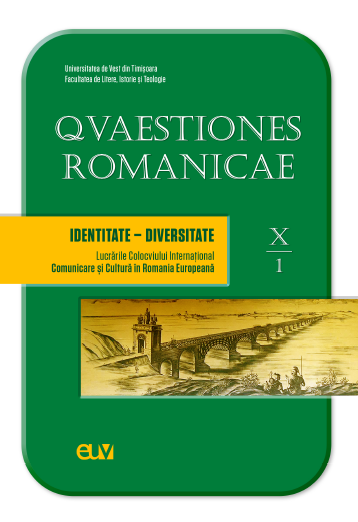Tristan Tzara – un maestru al practicilor transnaționale avangardiste
Abstract: (Tristan Tzara – A Master of the Avant-garde Transnational Practices): The presence of the Jewish writers within the avant-garde movements was important both in terms of numbers and in terms of their contribution to the development of these movements. Therefore, a series of theories emerged which tried to explain this phenomenon. The most widespread theory is the one that explains the massive orientation of Jewish writers towards the avant-garde movements by taking into consideration their anti-nationalist character. However, their interaction with the avant-garde is more complex and needs to be studied also from the relation it established with the aesthetic programs of the movements to which they adhered, with the personal history, with the identity model they adopted, as well as with the dynamic of their relationship with the “official” cultural environment. Furthermore, it necessitates an individual approach, because the interest of each of these writers for the aesthetic and extra-aesthetic programs of the avant-garde movements manifested itself in a different way. The present article studies the interest of Tristan Tzara, a Jewish writer born in Romania, for the experimental poetry and art, for the creation a movement which defined itself by means of purposes and artistic practices which had a transnational character. Thus, the purpose of the present paper is to highlight Tristan Tzara’s effort as an artist and promoter of the Dada movement to impose a new way of thinking in literature and art, but also a new type of identity, a supra/transnational identity, following his involvement in the publication of the Dada magazine, the conception of the Dadaglobe project, the creation and the publication of manifestos and texts with a programmatic character as well as in his intentions to revolutionize the poetic language.
Keywords: artistic practices, avant-garde, Jewish writers, supra/transnational identity, Tristan Tzara.
Rezumat: Prezența scriitorilor evrei în rândurile avangardelor a fost una notabilă atât din punct de vedere numeric, cât și sub aspectul contribuției lor la dezvoltarea acestor mișcări. Prin urmare au fost emise o serie de teorii care au încercat să explice acest fenomen. Cel mai des vehiculată teorie de acest fel este cea care explică orientarea masivă a scriitorilor evrei spre avangarde prin caracterul antinaționalist al acestor mișcări. Însă interacțiunea lor cu avangardele este mult mai complexă, necesitând a fi studiată și în raport cu programele estetice ale mișcărilor la care aderă, cu istoricul personal, cu modelul identitar pe care îl adoptă, precum și cu dinamica relației lor cu mediul cultural „oficial”. Mai mult, necesită o abordare individuală, căci interesul fiecăruia dintre acești scriitori pentru programele estetice și extraestetice ale avangardelor se manifestă în mod diferit. Articolul de față studiază interesul lui Tristan Tzara, scriitor evreu născut în România, pentru poezia și arta experimentală, pentru crearea unei mișcări care se definește prin scopuri și practici artistice cu caracter transnațional. Scopul acestei lucrări este, așadar, de a evidenția efortul lui Tristan Tzara, în calitate de artist și promotor al mișcării Dada, de a impune un nou mod de a gândi literatura și arta, dar și un nou tip de identitate, o identitate supra-/transnațională, urmărind implicarea lui în apariția revistei Dada, în conceperea proiectului Dadaglobe, în redactarea și publicarea manifestelor și a textelor cu caracter programatic, precum și în intențiile sale de revoluționare a limbajului poetic.
Cuvinte-cheie: practici artistice, avangardă, scriitori evrei, identitate supra-/ transnațională, Tristan Tzara.
